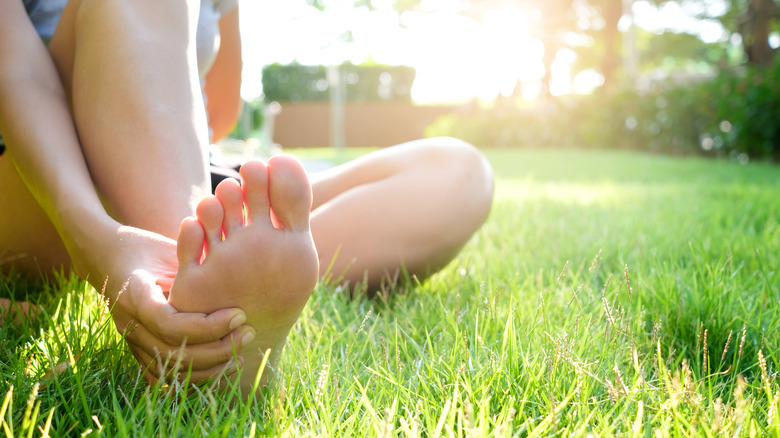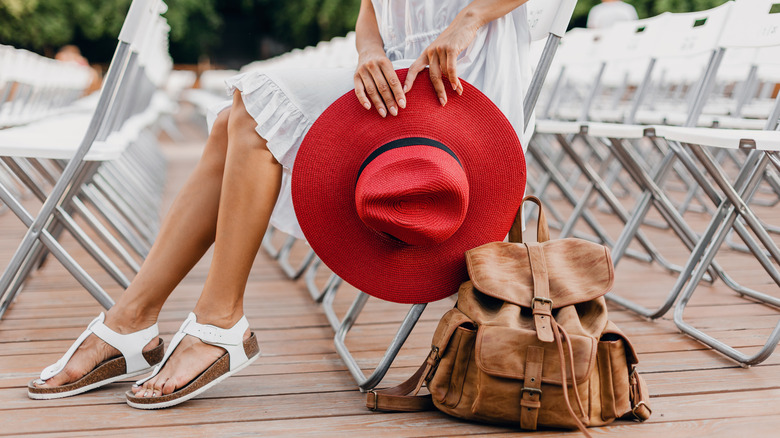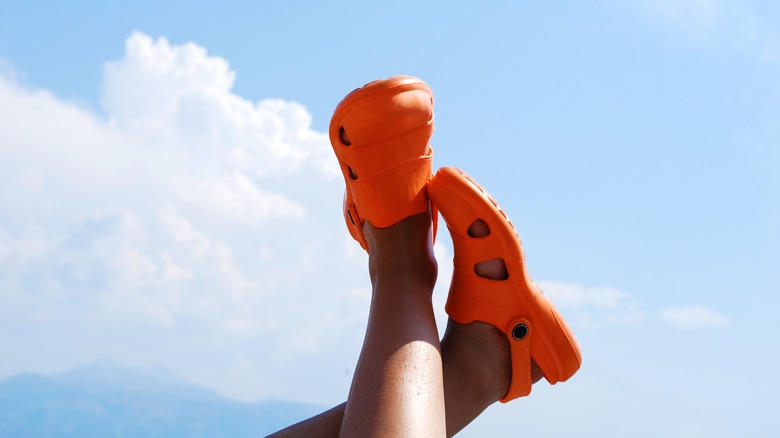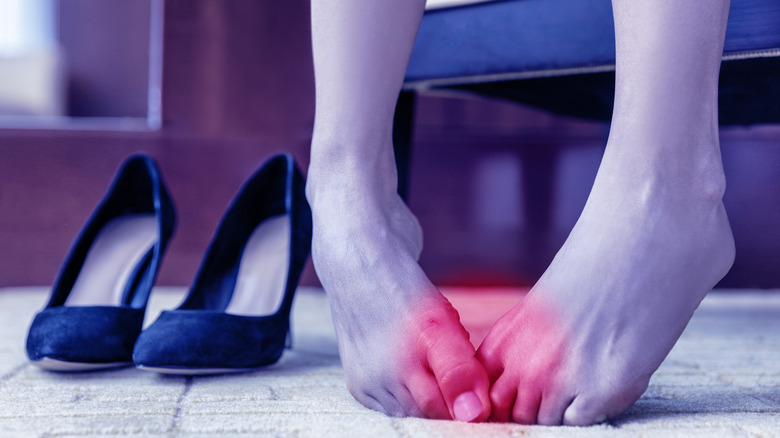
What could be more enjoyable than walking on the beach in your favorite summer shoes? Nothing can beat the feeling of sand in between your toes on a warm, sunny day. While there’s nothing wrong with wearing flip-flops every now and then, this habit can actually hurt your feet in the long run. Flip-flops are often to blame for ankle sprains, heel spurs, hammertoe, splinters, and other foot problems, warns Dr. Eunice Ramsey-Parker (via The Healthy).
These popular summer shoes also leave your feet vulnerable to injuries. Over time, they may change your stride and cause toe deformities. “The toes actually bend up and stay in a fixed position that looks like a little hammer,” notes Dr. Ramsey-Parker. If you’re not ready to give up flip-flops yet, choose a model with sturdy soles. Birkenstock-type shoes can be a good choice, as they offer more support and protection than regular flip-flops.
But flip-flops are not the only type of shoe that can hurt your feet. Wedges and other summer favorites may cause just as much damage. Here’s what you should know about it.
Flat sandals can lead to stress fractures

Flat sandals may seem more comfortable than high heels, but this doesn’t mean they’re good for your feet. The same goes for ballet flats, which provide minimal orthopedic support. Over time, flats may cause back, hip, and foot pain, among other issues. “People think that they are doing the right thing by wearing flats if they are standing all day, but they don’t realize how much damage they can cause. A low, broad-based heel with support can be 10 times better,” Dr. Nichola Dunne told the Irish Examiner.
Sandals and other types of summer shoes with thin, flat soles may also cause cracked heels, warns Dr. Jane Andersen (via Oprah). With regular use, they may contribute to stress fractures. Moreover, they leave your feet vulnerable to bacteria, fungi, and other pathogens. Flat sandals with straps are just as bad, says Dr. Andersen. Ideally, choose a model with arch support and padding on the insole.
Clogs put stress on the knee

Clogs are a favorite choice for nurses, medical residents, and other professionals who have to stand all day. Unfortunately, they don’t offer enough support for long walks and prolonged standing. Just like flats and flip-flops, clogs have rigid soles and provide no shock absorption. In the long run, they may put stress on your back, hips, knees, and ankles, as Dr. Andrea Waters-Rist explained to the Daily Mail.
A 2010 study published in Arthritis Care and Research confirms these claims. Researchers found that clogs and stability shoes, such as the Brooks Addiction Walker, put up to 15% more pressure on the knee joint than flip-flops and flat walking shoes. The study was conducted on people with osteoarthritis of the knee, but its findings may apply to healthy individuals as well. Scientists recommend wearing flat, flexible footwear instead of clogs and other types of shoes with rigid soles.
High heels may cause foot injuries

High heels might be your favorite summer shoes, but it’s best to wear them sparingly. The experts at Piedmont Healthcare warn that 3- to 4-inch heels throw the body out of alignment, putting stress on the back, hips, legs, and feet. Over time, they may cause calluses and aches. This type of footwear can also shorten the Achilles tendon, which may contribute to plantar fasciitis and other foot conditions, says Southern Ocean Medical Center podiatrist Eric Baskin (per Hackensack Meridian Health).
Wedge shoes are a better option — just make sure you choose a model with no more than 1/2- to 1.5-inches in heel height, suggests Piedmont Healthcare. Ideally, opt for wedge sandals that band at the forefoot. This kind of shoe lifts your foot without putting pressure on the toes or causing balance issues.
If you still want to wear heels, make a habit out of stretching your feet daily. Do it for 15 minutes before leaving home and then again later in the day, recommends Dr. Baskin. He also suggests soaking your feet in a warm Epsom salts bath when the day is over. If your feet still hurt, go a half size up and consider using orthotics. Another option is to opt for shorter heels. Anything over 2 inches is likely to cause problems later down the road, Dr. Baskin says.
Source: Read Full Article